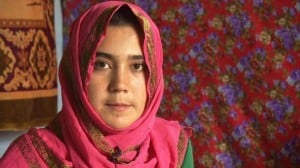Several of hundreds of activists have been protesting against the Moroccan “rape law“, after Amina Filali’s death on March 10. At the same time, the force behind the marriage of Amina and her rapist, Amina’s mother, says that she regrets the marriage, but that she did not really have a choice.
A British Muslim juror has been excused from sitting on a case, after she refused to take off her niqab. The chairman of the Islamic Human Rights Commission said that the decision from the judge is unacceptable.
In Lebanon, a 70-year-old woman has been raped by a 23-year-old man; both are from a Palestinian refugee camp in the south of Lebanon. He is said to have raped a young girl before, and has married her in order to avoid punishment. May Allah give the victims of this man’s actions justice.
Iman Musa and Majida Mugrabi are Muslim, lesbian, and a couple. They arrived in Canada in 2007, and filed a refugee claim, as they fear they will be killed by their family, if they would return to Israel. At first their refugee claim was unsuccessful, but now they have been given a second chance.
A Russian court has decided in the baby-swap case: the Russian girl, raised by the Tajik father, will get the Russian mother’s name on the birth certificate. The Tajik father, who is not the biological father and is divorced and was raising the girl alone, will remain the father named on the birth certificate.
An Egyptian teenager in Kuwait has thrown herself off a balcony to avoid a forced marriage, arranged by her family. She survived and an investigation has been launched by Kuwaiti police.
Rasema Handanovic, a Bosnian woman, has been charged with war crimes against Croats by a local court.
Shahtaj Khanum, the ex-deputy mayor of the Indian city Bangalore, found out about her divorce, through a newspaper advertisement. She is determined to fight in court against this “illegal method” of divorcing.
In the Nigerian city of Kano, there are now approximately 1 million women of “marriageable status” who are looking for husbands. Now the Kano state government has announced a new program to solve this problem: an “initial public offering” of marriageable women. The Voice of Widows, Divorcée and Orphans of Nigeria (VOWAN) is calling for the government officials to take a stand and marry one (or more) of the women themselves.
A bomb ambush killed one school girl and injured four others in Pattani, southern Thailand. Authorities believe the bomb was aimed at rangers, but they had already passed when the bomb exploded.
Worldpress.org features an article on Maryam Bibi, a Pakistani chief executive of a women’s charity in volatile city of Peshawar.
A Turkish woman who went to university and had a good job in Germany, while wearing her hijab. She was much disappointed when in her native Turkey she was not even allowed to hand in an application because of her hijab.
In an audio slideshow, two Chadian women tell about the hardships that have come with the poor harvests and lack of food. In some regions in West Africa, water levels have never been so low.
A Philadelphia security firm has to pay a settlement of US$50,000 to a former employee was told that she could not wear her khimar (headscarf) to her work. Funny thing is that she was wearing a khimar during her job interview, and they hired her, without mentioning anything about the “company dress code.”
Afghan Girl Scouts from broken homes hope that working at a restaurant and learning vocational skills might help them to build a better future.
The turmoil in northern Mali is hindering the fight to treat and prevent obstretic fistula. Obstretic fistula is a tear in the birth canal, as a result of a hard labour, and results in the leaking of urine and faeces. Due to the fighting many women cannot be reached, and women who have this are often shunned by their communities.
A report on unemployment by the Arab League shows that Libya is the only country where the unemployment rate for women is lower than that of men. Mauritania has the highest percentage of female unemployment: 44%.
Maymun Muhyadine Mohamed is a young mother and a widow, and she loves the beautiful game: soccer. Because of her love of playing soccer, even though she was covered, her husband was murdered and she had to flee her native Somalia to neighbouring Djibouti.
Even though transvestites often do not feel safe in the streets in Indonesia, an Islamic school in one of Indonesia’s bigger cities, Yogyakarta, is welcoming transvestites to practice and learn about their religion.
In Lebanon, hijab wearing women were admitted to join the security forces, but one of the officials in charge of the training of the new recruits, Susan al-Hajj, gave those who wear the hijab the choice to either keep the headscarf or take the job.
Saudi Arabia is one of the three nations that has never sent a female athlete to the Olympic Games, but has now shown an interest in doing so, if the sport the woman competes in is deemed to be appropriate. The other countries, Qatar and Brunei, may do so as well.
In Uzbekistan, a new law limits the practising of religion even more: the sale of religious garments, such as the hijab, is now forbidden. As well, the religious literature of four Muslim women and a Protestant have been destroyed. The four Muslim women were all working in the same kindergarten and used to at times discuss religious topics during their breaks, and exchange religious books. You can’t be too careful; it could be terrorist cell after all!
Nobel Peace Laureate Tawakul Karman visited a Syrian refugee camp in Turkey.
Muslim women in Ireland are asked now to remove their headscarves for the picture on the Irish resident card. This new approach is part of new procedures introduced by the Garda National Immigration Bureau.
The new Turkish domestic violence law, which was passed on March 8, is a disappointment, says Turkish activist Pinar Ilkkaracan. It focuses yet again more on the family than on the woman, and she explains that protecting both is very contradictory.
In the West African country of Mauritania, an approximately 10 – 20% of the population lives in slavery. CNN’s Freedom Project features the horrific story of one of these former slaves, Moulkheir Mint Yarba.
Algerian women played an important role in obtaining independence 50 years ago, but today the role women play in politics, for example, is still marginal.
Sapiyat Magomedova is a Dagestani lawyer who was beaten by police and has a court case against her, but she will not be stopped: she continues to defend victims of torture and kidnapping by security forces.
Many teenage Bangladeshi prostitutes take steroids to appear healthier, even though the effects can be lethal in the long run.
A French women’s soccer match was called off last week, because one of the players entered the field wearing a hijab.
Protests by students in Saudi-Arabia have been rare, but the last year several protests have erupted at different universities, and they were initiated mainly by women.











